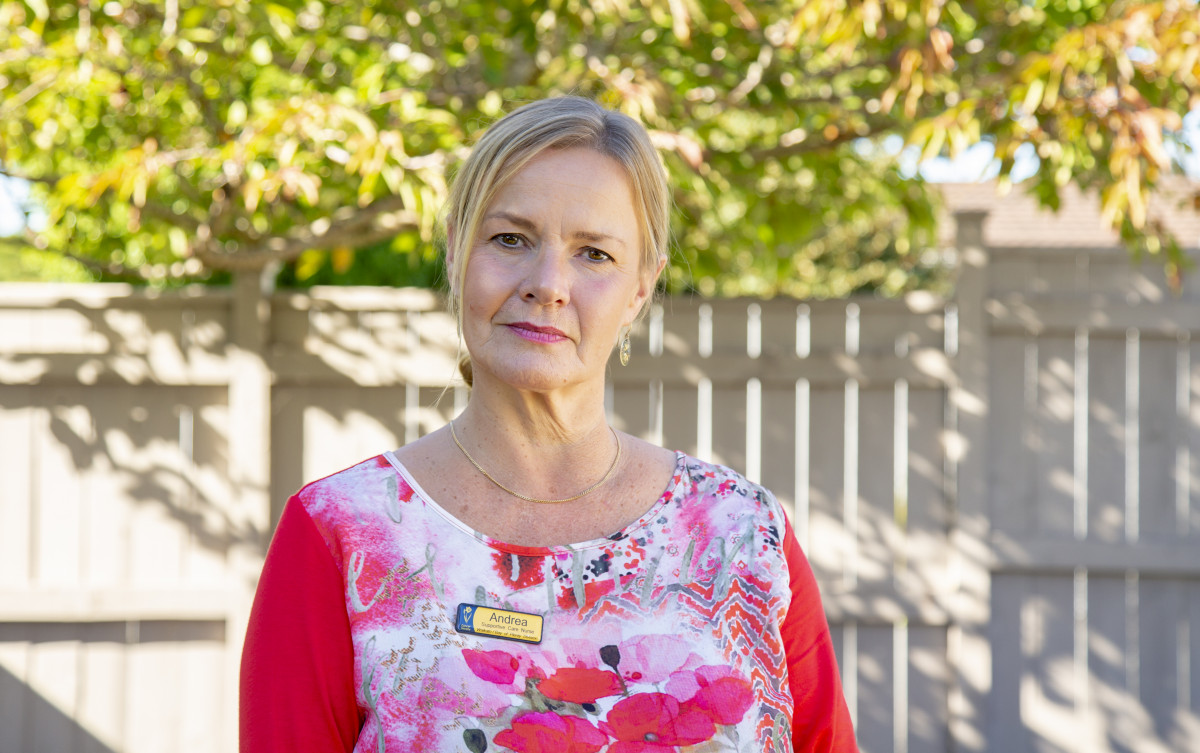One of the biggest challenges in a Covid-impacted world is having to provide supportive care largely from the dining room table.
Under the Red setting of the Covid-19 Protection Framework, Cancer Society supportive care nurses, like Andrea Youngs, are unable to make home visits to people with cancer and their whānau to reduce the risk of spreading the virus in the community.
“One of the main changes for us has been working from home. We used to have the odd day working from home, but now I find myself doing everything from here,” says Andrea.
“Planning my day is different because I have to think about whether it is a necessity to be out and about. I’m very aware that Covid is not something I want to unwittingly pass on to my clients so it’s about keeping myself safe so I can keep other people safe.”
After tackling emails and messages, Andrea turns to the caseload of clients assigned to her. There are some she calls daily or weekly, others fortnightly and some less frequently, depending on their individual situations.
Relying on phone conversations, she says, makes her job that much more challenging.
“When we meet clients face-to-face, we assess their non-verbal communication. It’s the gaps in conversation, the body language and the way people hold themselves that may say to me ‘that person may have some pain or distress going on there.’ On the phone you’re reliant on the words, but you need the whole package.”
Andrea is based in Rotorua, and many of her clients travel to Waikato Hospital for treatment. While there, they stay at the Cancer Society’s Lions Lodge
“When clients stay at the Lodge and are going to the hospital for treatment, nurses are there every day, so any problems are identified right away and it’s normally quite a seamless process.
“But clients in the community could fall through the cracks. We’re trying to make sure they don’t.”
People affected by cancer in the community can contact Cancer Society directly if they need support. A referral from their doctor is not necessary.
Andrea adds the situation has sparked an uptake in counselling referrals.
“People are finding a cancer diagnosis so much more challenging. We all have other things going on in our lives, then you add Covid and a cancer diagnosis and you realise how many variables there can be.
“There is uncertainty. People are thinking ‘how long is Covid going to go on for? Am I going to have to cope like this all through my treatment?’
“I think people are especially grateful of us during these times. Yes, there are things they’re missing but they know we are here and that they can reach out at any time.”
Despite the challenges, Andrea says there have been plenty of positives.
“I’m reaching out more and more to healthcare professionals in the community and pulling together with other NGOs and hospital staff. I’m feeling we’re quite united at the moment.
“Together, we’re making sure people are getting through. We’re reaching out in different ways, we’re using our communication skills differently and we’re coming up with solutions.
“On good days, I put the phone down and think ‘gosh - I’ve spoken to a lot of people. I’ve done good work today!’”
About supportive care services
Cancer Society supportive care services are free for people with cancer and their whānau, and a referral is not necessary. People needing support can contact Cancer Society on 0800 22 77 44.
On good days, I put the phone down and think ‘gosh - I’ve spoken to a lot of people. I’ve done good work today!’
Andrea Youngs, Supportive Care Nurse

